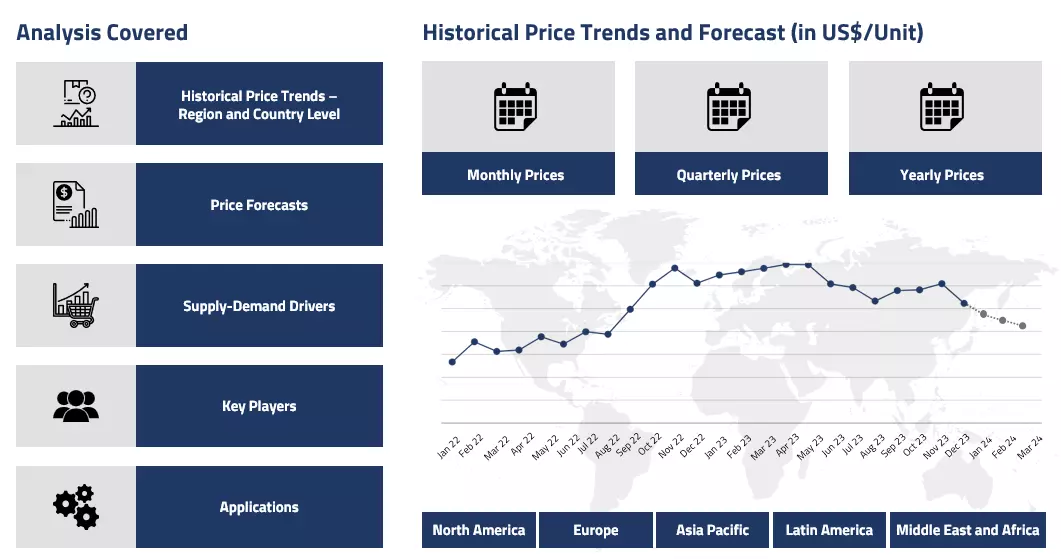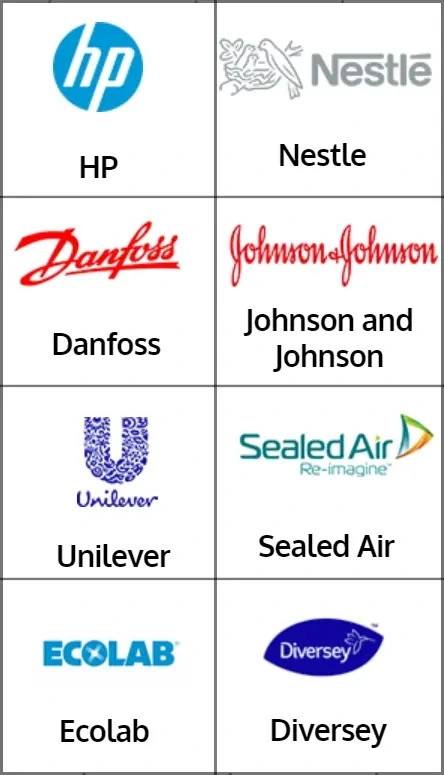Product
Antimony Price Trend and Forecast
Antimony Price Trend and Forecast
Antimony Regional Price Overview
Get the latest insights on price movement and trend analysis of Antimony in different regions across the world (Asia, Europe, North America, Latin America, and the Middle East & Africa).
Antimony Price Trend for the Second Half of 2024
Due to geopolitical concerns and strategic market factors, antimony saw a sharp price increase in the second half of 2024. A turning point was reached when China restricted the export of vital minerals, severely limiting global supply and causing unheard-of market volatility. The metal's worth was further increased by its strategic significance in military applications, especially for defense technology, infrared missiles, and ammunition.
Antimony Price Chart

Please Login or Subscribe to Access the Antimony Price Chart Data
Due to the supply constraints, investors and mining corporations quickly responded, causing the market to experience a sharp price trajectory. Western nations started actively looking for alternate sources of manufacturing, showing special interest in countries that were rich in antimony, such as Tajikistan, Turkey, and Myanmar. As the metal's strategic importance grew, mining firms like Perpetua Resources saw a sharp increase in their market values.
In addition to the estimated 10,000-ton worldwide supply gap, the price increase was exacerbated by geopolitical tensions between China and the United States. With national security and military readiness playing a major role in market dynamics, the trade war and export limitations produced a perfect storm for antimony pricing.
Analyst Insight
According to Procurement Resource, more volatility is predicted for Antimony market in the future, with possible price stabilization contingent on geopolitical discussions and diversification of the world's sources of antimony production.
Antimony Price Trend for the First Half of 2024
In the first half of 2024, antimony prices saw a significant upward trend driven by a combination of supply shortages and rising demand across various sectors. The global antimony market experienced tightening supply conditions due to declining ore grades, depleting mines, and disruptions in key producing countries such as Myanmar, Oman, Tajikistan, and Vietnam. Further compounding the supply constraints were Western sanctions on Russia, a major supplier to China, leading to a significant reduction in exports and contributing to market uncertainty.
Meanwhile, demand for antimony surged, particularly from the solar sector, where the metal is used to enhance the performance of photovoltaic cells. Geopolitical tensions and increased military spending also heightened the demand for antimony, which is critical for ammunition and other defence applications. The market saw further strain with China, the world's largest producer, accounting for nearly half of the global supply, announcing export restrictions starting in mid-September, a move expected to exacerbate the supply deficit.
In response to the constrained supply environment and robust demand, European and U.S. buyers began diversifying their sources, increasing imports from alternative suppliers like Tajikistan, Vietnam, and Myanmar. Despite these efforts, the market continued to rely heavily on China, with tight supply conditions persisting and no immediate relief in sight.
Analyst Insight
According to Procurement Resource, the market outlook for the remainder of 2024 suggests continued price volatility, with further increases anticipated as the supply deficit widens and demand remains strong.
Antimony Price Trend for the Second Half of 2023
Antimony's primary use lies in flame-retardant formulations for plastics, textiles, and electronics, enhancing fire resistance. In the field of semiconductors, antimony plays a crucial role as a dopant, which expands its usability in the automotive market. It's also used in lead-acid batteries as antimony improves their performance and longevity. Moreover, antimony compounds are catalysts in polyester resin production, and along with the above-mentioned factors, it drives its price trend.
According to a year-end report, based on the consumption levels of antimony in the latter two quarters of 2023, the photovoltaic sector is poised to consume about 50,000 tonnes of antimony, constituting nearly one-third of global usage in 2024. Antimony trioxide serves as a pivotal flame retardant in plastics and textiles, with the flame-retardant sector comprising half of its overall consumption.
This statistic was based on the surge in demand from the PV industry in the third and fourth quarters of 2023, which strained antimony supply dynamics and resulted in a remarkable surge in its price trend. Chinese antimony metal prices surpassed those of other countries, fueled by heightened demand from China's dominant PV sector. Global antimony consumption in 2023 was estimated to be at 160,000 tonnes. China remained the primary global antimony producer, but the exceeding demand and expanding applications of the metal caused a scarcity of antimony in various parts of the world.
Analyst Insight
According to Procurement Resource, the price of Antimony is expected to shoot upwards as the imbalance of supply and demand is estimated to roll in favor of the antimony price trend.
Procurement Resource provides latest prices of Antimony. Each price database is tied to a user-friendly graphing tool dating back to 2014, which provides a range of functionalities: configuration of price series over user defined time period; comparison of product movements across countries; customisation of price currencies and unit; extraction of price data as excel files to be used offline.
About Antimony
Antimony is a silvery- bluish- white brittle, and flaky-looking solid metalloid. It occurs naturally as a sulfide mineral stibnite. It is non-reactive towards cold water and cold acids but dissolves in hot acids and aqua regia. It has applications in the manufacture of semiconductors and batteries and as a flame retardant.
Antimony Product Details
| Report Features | Details |
| Product Name | Antimony |
| Industrial Uses | Infrared detectors, diodes, lead hardening, Batteries, bullets and arms, flame retardant |
| Chemical Formula | Sb |
| HS Number | 81109000 |
| CAS Number | 7440-36-0 |
| Synonyms | Stibium (Latin name, hence the symbol Sb) |
| Molecular Weight | 121.76 g/mol |
| Supplier Database | Hunan Gold, Mandalay Resources, Huachang Antimony Industry, Hsikwangshan Twinkling Star, Guizhou dongfeng antimony, Hechi Nanfang Non-ferrous Metals Group, GeoProMining, China-Tin Group, Anhua Huayu Antimony Industry. |
| Region/Countries Covered | Asia Pacific: China, India, Indonesia, Pakistan, Bangladesh, Japan, Philippines, Vietnam, Iran, Thailand, South Korea, Iraq, Saudi Arabia, Malaysia, Nepal, Taiwan, Sri Lanka, UAE, Israel, Hongkong, Singapore, Oman, Kuwait, Qatar, Australia, and New Zealand Europe: Germany, France, United Kingdom, Italy, Spain, Russia, Turkey, Netherlands, Poland, Sweden, Belgium, Austria, Ireland Switzerland, Norway, Denmark, Romania, Finland, Czech Republic, Portugal and Greece North America: United States and Canada Latin America: Brazil, Mexico, Argentina, Columbia, Chile, Ecuador, and Peru Africa: South Africa, Nigeria, Egypt, Algeria, Morocco |
| Currency | US$ (Data can also be provided in local currency) |
| Supplier Database Availability | Yes |
| Customization Scope | The report can be customized as per the requirements of the customer |
| Post-Sale Analyst Support | 360-degree analyst support after report delivery |
Note: Our supplier search experts can assist your procurement teams in compiling and validating a list of suppliers indicating they have products, services, and capabilities that meet your company's needs.
Antimony Production Processes
In the production of antimony, Stibnite is firstly concentrated via grinding, milling, floatation and gravity separation of the ores, followed by volatilization, where Stibnite is oxidized, and the collected fumes are then reduced into the metal antimony.
Methodology
The displayed pricing data is derived through weighted average purchase price, including contract and spot transactions at the specified locations unless otherwise stated. The information provided comes from the compilation and processing of commercial data officially reported for each nation (i.e. government agencies, external trade bodies, and industry publications).
Assistance from Experts
Procurement Resource is a one-stop solution for businesses aiming at the best industry insights and market evaluation in the arena of procurement. Our team of market leaders covers all the facets of procurement strategies with its holistic industry reports, extensive production cost and pre-feasibility insights, and price trends dynamics impacting the cost trajectories of the plethora of products encompassing various industries. With the best analysis of the market trends and comprehensive consulting in light of the best strategic footstep, Procurement Resource got all that it takes.
Client's Satisfaction
Procurement Resource has made a mark for itself in terms of its rigorous assistance to its clientele. Our experienced panel of experts leave no stone unturned in ensuring the expertise at every step of our clients' strategic procurement journey. Our prompt assistance, prudential analysis, and pragmatic tactics considering the best procurement move for industries are all that sets us apart. We at Procurement Resource value our clients, which our clients vouch for.
Assured Quality
Expertise, judiciousness, and expedience are the crucial aspects of our modus operandi at Procurement Resource. Quality is non-negotiable, and we don't compromise on that. Our best-in-class solutions, elaborative consulting substantiated by exhaustive evaluation, and fool-proof reports have led us to come this far, making us the ‘numero uno' in the domain of procurement. Be it exclusive qualitative research or assiduous quantitative research methodologies, our high quality of work is what our clients swear by.
Table Of Contents
Our Clients

Get in Touch With Us

UNITED STATES
Phone:+1 307 363 1045

INDIA
Phone: +91 8850629517

UNITED KINGDOM
Phone: +44 7537 171117
Email: sales@procurementresource.com

